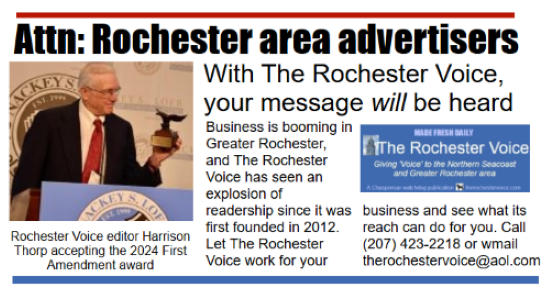COPYRIGHT2017© You can bet a lot of motorists will be out on the roads this holiday weekend, and you can bet that among them will be a fair share of habitual offenders, drivers who are a menace on the highways and put others at risk by regularly turning a blind eye to motor vehicle laws and your safety.
Just how prevalent are these motor vehicle miscreants?
Well, in just the past two years in New Hampshire, more than 1,400 drivers have been certified as habitual offenders.
With most habitual offender certifications running from one to four years in both New Hampshire and Maine, it's plain to see there's the potential for having a lot of bad actors driving beside you, or at you.
There's between two and three arrests of individuals certified as habitual offenders in Rochester every month. And most of them wouldn't have been caught if - you guessed it - they were driving properly.
Just recently two were arrested within a few days.
One, an East Rochester man, was stopped just before midnight in the area of D'Angelo's sub shop after he made an improper turn. He was arrested on drug possession charges, as a habitual offender and cited for the improper turn.
The other was a Milton man who was arrested for using a handheld mobile device like a cellphone while driving in front of an officer parked at the former Route 125 Quickie convenience store on Columbus Avenue.
Both men now face up to seven years in state prison if convicted.
It's a numbers game
So, how do you get to be certified as a habitual offender? It's not easy. You have to really work at it.
Chris Casko, an attorney, is the administrator at the Hearings Bureau at the Department of Safety.
He sat down for a long interview with The Lebanon Voice recently to explain just how someone ends up certified as a habitual offender.
First, there are both major and minor habitual offender offenses.
Major convictions include things like drunken or drugged driving, driving after revocation, disobeying a police officer or a hit-and-run or other conduct after an accident.
Minor convictions that could count toward certification include speeding violations, no license due to expiration, crossing a yellow line, even having an uninspected vehicle.
A driver can be certified as a habitual for several different combinations of major or minor convictions including.
Three majors in five years
Two majors and four minors in five years
One major and eight minor in five years
Twelve minors in five years
None of those would be imposed, Casko said, until the individual has their hearing where all the facts and nuances of each individual case are heard.
Habitual offender certifications last for one to four years, after which the offender has to apply to the bureau to be decertified, which would mean a return of all driving privileges.
The process to certify is a civil process, not a criminal one, Casko explained.
And while the numbers went down slightly from 2015 to 2016, that's not necessarily an indicator that the number of potential certifications went down. Because it is a civil process, offenders need to be served in hand with the paperwork.
"If the person is unable to be served, we are unable to certify them," he said. "As a result, there are people who qualify habitual who are not able to be certified, because they have not been found for service."
Casko added that since a lot of these people have suspended licenses already, they eventually will be able to be served when they attempt license restoration.
Meanwhile, if a person has been served with the hearing date, they are certified habitual in default if they then don't show.
Offenders reasons run the gamut
Strafford County Attorney Tom Velardi said he worked many cases of habitual offenders earlier in his career and said he got to know a lot of them through his work as a prosecutor.
He said the Hearings Bureau goes out of its way to be fair, while doing its job to keep the roadways as safe as it can from bad actors.
However, he said when you look at those caught up in driving as a habitual offender there are some for which you can have more empathy than others.
"For many they have to get to work to pay the bills, that's something a lot of them have in common," he said. "And then there are those who don't play by the same rules the rest of us play by."














